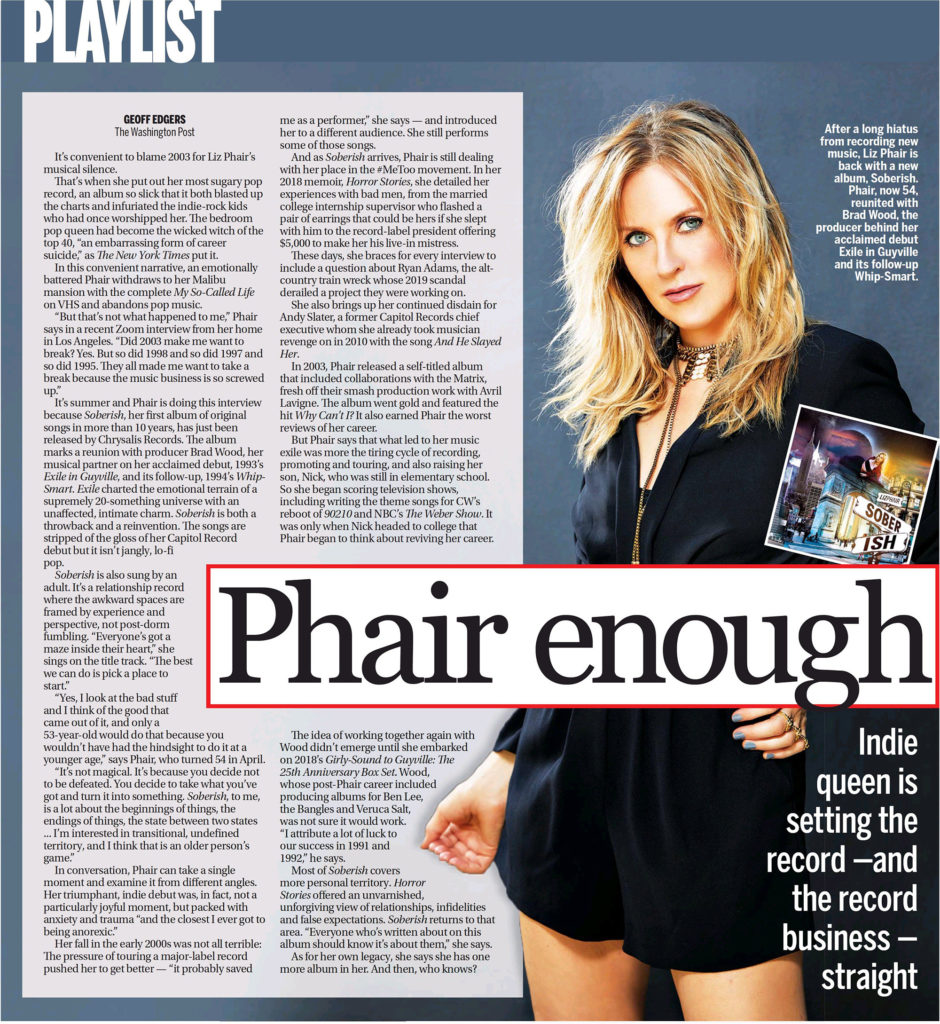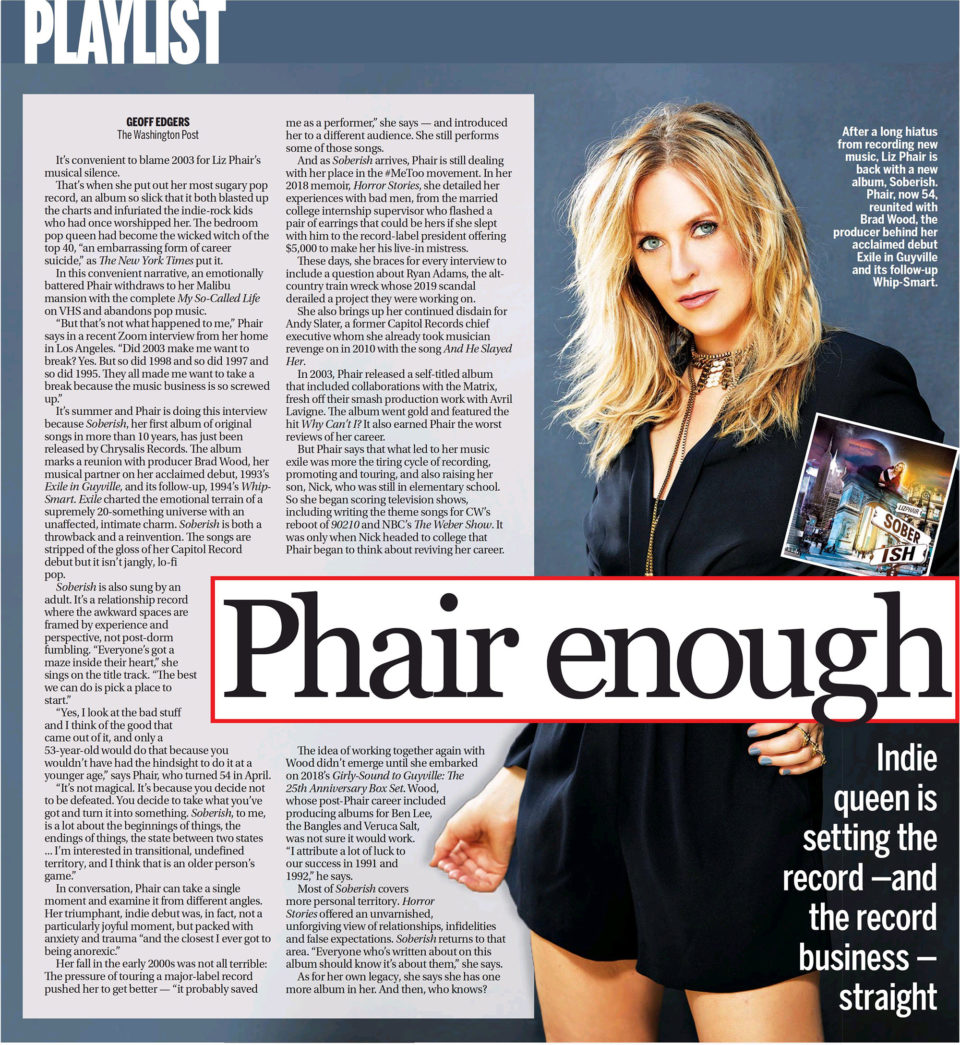By Geoff Edgers
Toronto Sun, June 28, 2021
It’s convenient to blame 2003 for Liz Phair’s musical silence.

That’s when she put out her most sugary pop record, an album so slick that it both blasted up the charts and infuriated the indie-rock kids who had once worshipped her. The bedroom pop queen had become the wicked witch of the top 40, “an embarrassing form of career suicide,” as The New York Times put it.
In this convenient narrative, an emotionally battered Phair withdraws to her Malibu mansion with the complete My So-called Life on VHS and abandons pop music.
“But that’s not what happened to me,” Phair says in a recent Zoom interview from her home in Los Angeles. “Did 2003 make me want to break? Yes. But so did 1998 and so did 1997 and so did 1995. They all made me want to take a break because the music business is so screwed up.”
It’s summer and Phair is doing this interview because Soberish, her first album of original songs in more than 10 years, has just been released by Chrysalis Records. The album marks a reunion with producer Brad Wood, her musical partner on her acclaimed debut, 1993’s Exile in Guyville, and its follow-up, 1994’s Whipsmart. Exile charted the emotional terrain of a supremely 20-something universe with an unaffected, intimate charm. Soberish is both a throwback and a reinvention. The songs are stripped of the gloss of her Capitol Record debut but it isn’t jangly, lo-fi pop.
Soberish is also sung by an adult. It’s a relationship record where the awkward spaces are framed by experience and perspective, not post-dorm fumbling. “Everyone’s got a maze inside their heart,” she sings on the title track. “The best we can do is pick a place to start.”
“Yes, I look at the bad stuff and I think of the good that came out of it, and only a 53-year-old would do that because you wouldn’t have had the hindsight to do it at a younger age,” says Phair, who turned 54 in April.
“It’s not magical. It’s because you decide not to be defeated. You decide to take what you’ve got and turn it into something. Soberish, to me, is a lot about the beginnings of things, the endings of things, the state between two states … I’m interested in transitional, undefined territory, and I think that is an older person’s game.”
In conversation, Phair can take a single moment and examine it from different angles. Her triumphant, indie debut was, in fact, not a particularly joyful moment, but packed with anxiety and trauma “and the closest I ever got to being anorexic.”
Her fall in the early 2000s was not all terrible: The pressure of touring a major-label record pushed her to get better — “it probably saved me as a performer,” she says — and introduced her to a different audience. She still performs some of those songs.
And as Soberish arrives, Phair is still dealing with her place in the #Metoo movement. In her 2018 memoir, Horror Stories, she detailed her experiences with bad men, from the married college internship supervisor who flashed a pair of earrings that could be hers if she slept with him to the record-label president offering $5,000 to make her his live-in mistress.
These days, she braces for every interview to include a question about Ryan Adams, the altcountry train wreck whose 2019 scandal derailed a project they were working on.
She also brings up her continued disdain for Andy Slater, a former Capitol Records chief executive whom she already took musician revenge on in 2010 with the song And He Slayed Her.
In 2003, Phair released a self-titled album that included collaborations with the Matrix, fresh off their smash production work with Avril Lavigne. The album went gold and featured the hit Why Can’t I? It also earned Phair the worst reviews of her career.
But Phair says that what led to her music exile was more the tiring cycle of recording, promoting and touring, and also raising her son, Nick, who was still in elementary school. So she began scoring television shows, including writing the theme songs for CW’S reboot of 90210 and NBC’S The Weber Show. It was only when Nick headed to college that Phair began to think about reviving her career.
The idea of working together again with Wood didn’t emerge until she embarked on 2018’s Girly-sound to Guyville: The 25th Anniversary Box Set. Wood, whose post-phair career included producing albums for Ben Lee, the Bangles and Veruca Salt, was not sure it would work.
“I attribute a lot of luck to our success in 1991 and 1992,” he says.
Most of Soberish covers more personal territory. Horror Stories offered an unvarnished, unforgiving view of relationships, infidelities and false expectations. Soberish returns to that area. “Everyone who’s written about on this album should know it’s about them,” she says.
As for her own legacy, she says she has one more album in her. And then, who knows?









